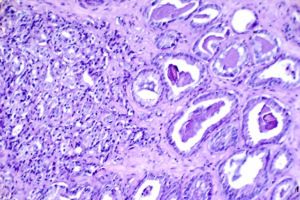News
Simple urine test for prostate cancer developed by Danish researchers
This article is more than 8 years old.
Every year, 4,500 Danish men are diagnosed as having prostate cancer. The condition may turn out to be fatal and the diagnostic process is extremely uncomfortable

It looks pretty, but it might kill you (photo: National Cancer Institute)
Danish researchers at Aarhus University have developed a new testing method in which a simple urine test can determine whether a man has prostate cancer or not, Videnskab.dk.
“With a high degree of accuracy, this method can differentiate between men who are healthy and those who have prostate cancer,” explained Professor Karina Dalsgaard Sørensen from the university’s molecular medicine department.
READ ALSO: New cancer plan put in motion
She hopes the new urine test will mean that fewer men in future will have to undergo an unpleasant prostate biopsy.
The needle and the damage done
In this process, the doctor inserts a needle up through the rectum to take a sample of the prostate gland. It is both unpleasant and carries the risk of infection, explains Sørensen.
“We’d like to avoid taking biopsies from men who don’t need them. We think that our urine test will be able to indicate more precisely which men ought to have a biopsy taken,” she continued.
It is hoped the test will be ready for use in Danish hospitals within the next five years.
It’s in the blood
At the moment, the first step in diagnosing prostate cancer is to take a blood test to measure the amount of PSA (Prostate-Specific Antigen). If there is a lot of PSA in the blood, that can be a sign of prostate cancer, but the method is too uncertain to make a definitive diagnosis. Patients with a high PSA level are usually then sent for a biopsy, and a lot of men undergo the test unnecessarily.
“From our results so far, we think our urine test is a more precise indicator than PSA in showing who needs a biopsy. If we combine a urine test with measuring the patient’s PSA, it is even more accurate,” said Sørensen
Is it dangerous or not?
However, the biggest problem with prostate cancer is still deciding whether a cancer is dangerous or not – and whether to subject the patient to a cancer treatment that can cause unpleasant side-effects.
Many men can live for decades with prostate cancer without it causing them any problems; only a small number of men develop the serious, deadly form of the cancer.
It is estimated that prostate cancer is present in around 50 percent of men over 50, but the cancer only turns aggressive and requires treatment in a few of them.
The problem is that it is difficult to differentiate between the aggressive and the benign forms of the cancer. “We simply don’t have good enough tools to see the difference,” Sørensen added.
So the team have also been using the urine test to try and determine whether it is able to differentiate between the forms of cancer. Tests carried out on 500 men who have had prostate operations have shown encouraging results in predicting whether someone will have a relapse or not, so the professor feels the test shows promise in this area too.










































